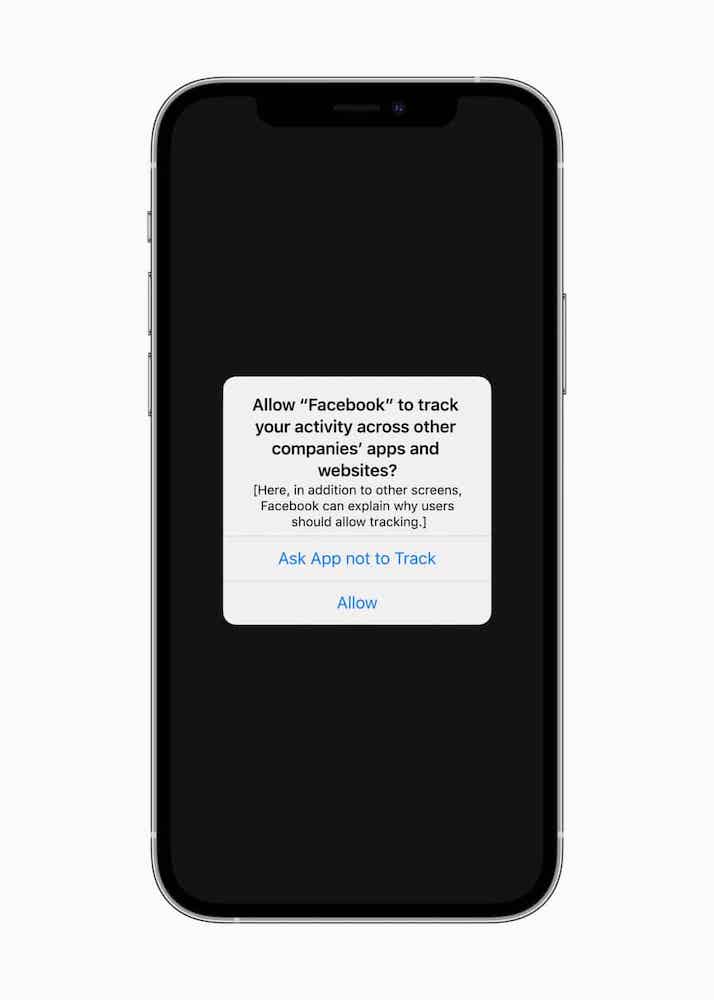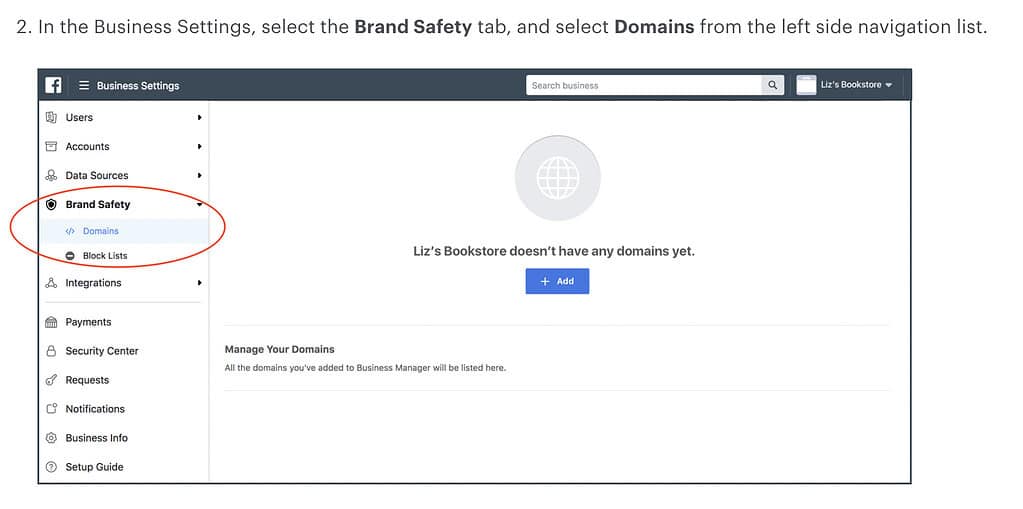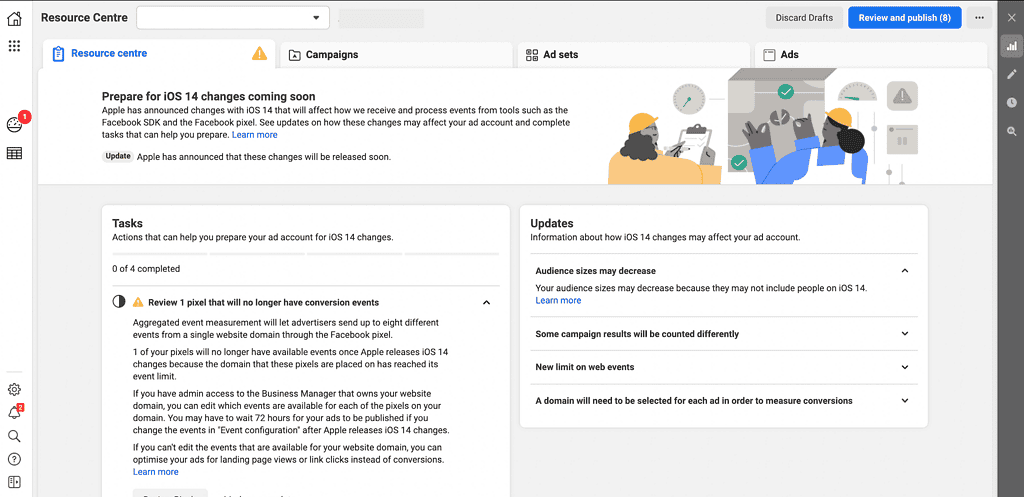Apple is making big privacy setting changes in its iOS 14 rollout. This will affect every business that advertises on iOS devices.
Is this you? Keep reading because in this blog, we’ll cover:
- What is Apple’s iOS 14 privacy update
- How will it affect advertisers?
- How advertising platforms like Facebook are responding
- What you need to do to prepare
What is Apple’s iOS 14 update?
Apple’s iOS 14 update includes a change to how apps deployed via Apple’s iTunes Store collect data. The iOS 14 update is released but Apple has not yet enforced the change to AdTracking worldwide. This is due to the strong push back from global advertising platforms and apps.
The Apple iOS 14 change will require every app provider to ask iOS 14 users for permission to be tracked across apps and websites.
This is what Apple’s required prompt will look like:

The Impact of Apple’s iOS 14 AdTracking Opt Out
AdTracking data allows brands to collect data for ads via the Identification For Advertisers (IDFA). If a user opts out of being tracked, their interaction data and preferences will no longer be tracked or used in audience targeting.
A person who opts out of AdTracking will still receive ads. However, the ads will not be personalised to their gender, interests or social media interaction and apps and websites they’ve recently interacted with.
This only applies to Apple’s iOS devices. There will be no change to ad tracking data for websites (cookies), desktops, Android devices or third party apps deployed on other operating platforms.
How many users are expected to opt out?
It’s not clear. However, the EU enforced the re-opt in for GDPR and the opt out rate was up to 40%.
Apple introduced location tracking permission prompts in the iOS 13 update. Opt-in rates to share data with apps when they’re not in use dropped from almost 100% to below 50%.
Around 70% of iOS users share their IDFA with apps at the moment, but that may drop by 50% when the iOS privacy prompt is enforced.
Who will be affected?
Anyone using an iOS device who updates to Apple iOS 14 and opts out of tracking will not be visible to advertisers except for the most valuable conversion event (ie: Became Lead or Purchased).
Data tracking won’t change for Android users and desktop users. Tracking of events will be limited to 8 key events for users who Allow AdTracking.
Anyone who runs advertising campaigns for leads or sales on iOS devices including: Facebook, Instagram, LinkedIn, Pinterest, Google,YouTube and TikTok.
How will Apple iOS 14 affect advertisers?
This is a big change for advertisers. The below section focuses on Facebook Ads Manager and what you can do to manage the impact.
Campaign Effectiveness – Event Tracking
Facebook will only track 8 conversion events per domain, such as Add to Cart, Purchase, Lead, and Complete Registration. It will ask you (or your account manager if you’re with a digital agency) to rank these in order of importance in Events Manager.
If you have both Add to Cart and Purchase as 2 of your 8 events, only the conversion event with the highest prioritisation will be recorded.
If you’re recording purchases as your highest ranking, assume that these people also added to cart.
You can change the priorities of these events, but note there’s a 3 day delay on running campaigns to ensure accurate reporting.
Tip: Don’t leave prioritising your events on Facebook too late. Take action now and get your events right. Expect a high demand and long support times when this change is enforced.
Targeting and Personalisation
There will be limitations on targeting by demographics.
Businesses can still target based on geographic and demographic segments, like age, gender and interests, for those who Allow Adtracking, but not those who opt-out.
Without breakdowns for age, gender and region, it’s challenging to adapt ads based on what your ideal audience is engaging with.
This will impact awareness/ prospecting campaigns most.
Your remarketing / retargeting ads will not tailor ads for anyone who’s visited your website but has opted out of AdTracking. Expect the cost of remarketing campaigns to go up as your ads won’t be as personalised to their recent experience.
Tip: Targeting will still be possible for FB and IG engaged audiences and Custom audiences so adapt your ad reach to drive Facebook and Instagram account engagement and create ads that move these people into your sales funnel.
Measuring Results
Make no mistake, measuring results across any channel you advertise on iOS devices will be impacted.
Facebook will move to a hybrid reporting model with aggregated (rolled up), delayed attribution and statistical modelling alongside the real-time reporting we’re used to.
Delayed attribution (the credit that’s given to an ad for a conversion) means that conversions will appear in Ads Manager within 3 days. Advertisers rely on these results to make quick adjustments to ad creatives, copy, audiences and budget based on the ad is performing, or to make the decision to pause/stop the ad completely.
Tip: make sure your ad goals, creative and copy is on point as small adjustments will cost you time and money once live.
7 Day Attribution Window
In preparation for Apple iOS 14 changes (and likely to help them collect data for their statistical reporting), Facebook changed the 28 day click window and all view-through attribution data to a 7 day click window and 1 day view, in January 2021.
Now, if someone viewed your ad and purchased/ converted because of it – but on day 8 – this would be reported as Organic rather than attributed to ROAS as it’s out of the 7 day tracking window. ROAS will decreas but conversions won’t disappear.
Tip: Compare your past 12 months of 28-day click conversions versus 7-day click conversions to understand how your reported conversions may be impacted.
Tip: Move remarketing to a higher frequency in the 7 day window, but avoid spamming recently purchased customers.
Aggregated and Statistical Reporting
With opt-outs, a substantial amount of data will be missing. Overall reporting will be a mix of attributable events (from people who opt-in) and estimated results (from those who opted out). You’ll be notified in the Ads Manager when estimated results (Agregated Event data) is used.
Facebook is also changing how it processes pixel conversion events – taking a lead from Google’s Enhanced Privacy Mode tracking and continues to lobby Apple for the ability to personalise ads and track their effectiveness.
In their APAC Region “What Matters” update to Advertisers in March, Facebook notes this is all still a work in progress with a lot of “wait and see”.
Here’s a Checklist to Prepare for the Apple iOS 14 update
- Verify your Domain with Facebook
Facebook is prompting all advertisers to verify their website to ensure they can track selected events that were triggered by ads. Noting this will only be able to track events that were triggered.
Follow these steps to verify your Domain.
Note: you will need to be an ADMIN of your Facebook Business accounts and be able to access your DNS records with your website hosting provider and your website’s header code.

- Confirm 8 conversion events for Facebook
Facebook can collect up to eight events for your reporting so it’s important to prioritise.
After verifying your Domain, confirm with Facebook your 8 most important conversion events.
For eCommerce businesses this is likely: Add to Cart, Initiate Checkout, Purchase, Page View, Lead and Complete Registration and any custom conversions you have set up by going to Events manager > Pixel.
For B2B organisations using lead forms but not online purchasing, you’ll want to include: Page View, Lead, Select Date, Make Booking, Complete Registration and any custom events you have set up.
Go to Business Managers > Ads Manager > Resource Centre and follow the prompts from Facebook.

Time for Holistic View of Ad Results
Data on who visited your website due to ads on iOS devices becomes skewed (towards increases in Organic) and people who opt out won’t be included in your website retargeting or lookalike audiences, but there are still ways to retarget and include them in custom audiences.
Anyone who has visited your FB page or IG account, engaged with your social content or clicked on an ad is included in your Facebook engaged audience.
Tip: Ensure your organic marketing efforts are focused on audience building and engagement.
Tip: Keep your Custom Audiences updated. Upload customer lists to Facebook regularly. You can remarket to Custom Audiences even if they’ve opted out.
Tip: Use analytics from your storefront like Shopify, Magento and Google Analytics to look at your entire dataset.
Tip: Be prepared to reallocate your ad budget across different types of campaigns in Facebook Ads and Google. Platforms that allow ads and which desktop viewing is preferred or high volume – like YouTube – may be a cost effective offset to restrictions on iOS devices.
Don’t forget to build your Email Lists!
Email marketing feels old school but it’s conversion rate can be as high as paid ads.
Incorporate generating leads and getting email addresses into your paid strategy. This way you can rely less on pixel optimisation for retargeting and instead, grow Custom Audiences.
Tip: Run a competition or subscriber offer and invest in creating gated content that’s of value to your audience.
Look at Advertising’s Total Effect on Growth
Attribution of ad results are more difficult to track so advertisers will need to look at overall business growth as a complete indicator of your paid strategy’s effectiveness.
If you’re solely focused on ROAS, expect a dip (potentially a nose dive), and a lift in organic conversions.
The result is still new customers, revenue and business growth.
Check Back for Updates!
There’s ambiguity around the extent to which this change will affect advertisers. Facebook continues to lobby Apple for better communication and education of Apple iOS users on personalisation and privacy, arguing that the two need not compete.
The team at Agency by Workit will keep this blog updated as more information and data on the impact on advertisers over the coming months. Be sure to subscribe or check back for updates!